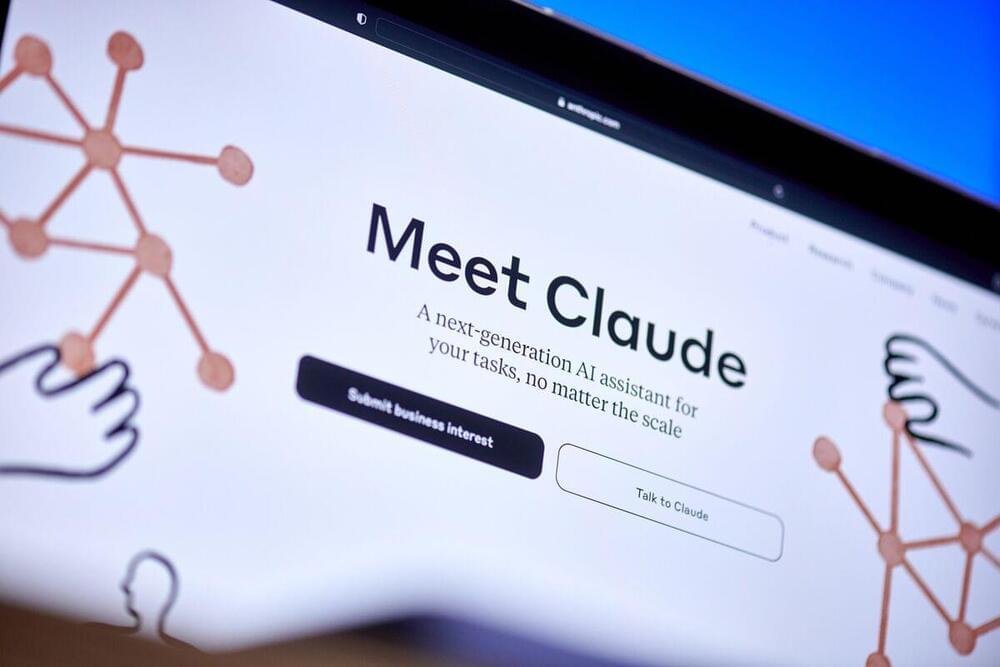Archive for the ‘business’ category: Page 9
Oct 23, 2024
Mike Kelly — President & CEO, NervGen Pharma — Innovative Treatments To Enable Nervous System Repair
Posted by Ira S. Pastor in categories: biotech/medical, business

Mike Kelly is President & Chief Executive Officer of NervGen Pharma Corp. (https://nervgen.com/), a clinical-stage biotech company dedicated to developing innovative treatments to enable nervous system repair in the settings of traumatic injury and disease.
NervGen’s lead drug candidate, NVG-291, is being evaluated in a Phase 1b/2a clinical trial in an initial target indication, spinal cord injury. NervGen has initiated preclinical evaluation of a new development candidate, NVG-300, in models of ischemic stroke, amyotrophic lateral sclerosis (ALS) and spinal cord injury.
Oct 22, 2024
Charoen Thani Hotel, Khon Kaen. · 260 Sri Chant Rd, Nai Mueang, Mueang Khon Kaen District, Khon Kaen 40000, Thailand
Posted by Chavis Srichan in categories: business, lifeboat, mapping
The name of the conference will be lifeboat foundation conference for polymaths futuristics and visionaries.
The place will be this hotel.
Oct 22, 2024
Slack researcher discusses the fear, loathing and excitement surrounding AI in the workplace
Posted by Shubham Ghosh Roy in categories: business, robotics/AI
People with AI are going to replace people without AI.
SAN FRANCISCO (AP) — Artificial intelligence’s recent rise to the forefront of business has left most office workers wondering how often they should use the technology and whether a computer will eventually replace them.
Those were among the highlights of a recent study conducted by the workplace communications platform Slack. After conducting in-depth interviews with 5,000 desktop workers, Slack concluded there are five types of AI personalities in the workplace: “The Maximalist” who regularly uses AI on their jobs; “The Underground” who covertly uses AI; “The Rebel,” who abhors AI; “The Superfan” who is excited about AI but still hasn’t used it; and “The Observer” who is taking a wait-and-see approach.
Oct 22, 2024
Microsoft introduces autonomous AI agents
Posted by Dan Kummer in categories: business, robotics/AI
Microsoft on Monday said it was enhancing its AI offerings with new autonomous agent capabilities as the tech titan aims to accelerate business adoption of artificial intelligence.
AI agents are specialized programs designed to perform routine tasks autonomously, such as sifting through sales leads or handling customer service inquiries.
The AI agent has become the newest buzzword for major software companies that are investing billions in powerful AI models, which they believe will shape the future of computing.
Oct 19, 2024
AI Explained: AI Agents Are Quietly Taking Over Everyday Tasks
Posted by Mike Diverde in categories: biotech/medical, business, employment, finance, robotics/AI
Although UBTech is leaving 10% of work for humans in management, other AI tech is being specifically developed for that niche: OpenAI’s new framework, Swarm, allows AI agents to collaborate and independently execute complex tasks, potentially boosting business efficiency.
Artificial intelligence agents are everywhere, quietly reshaping industries and automating tasks we didn’t think possible a few years ago. Unlike basic automation, these AI agents can handle complex jobs, think independently and learn from their environment. The result? Healthcare, finance and logistics businesses are seeing rapid gains in efficiency — and, in some cases, doing away with manual work altogether.
What are AI agents exactly? They’re software programs that carry out specific tasks without constant supervision. Whether handling customer requests, diagnosing medical conditions or predicting market trends, AI agents are versatile workhorses. Instead of waiting for humans to input every command, these agents operate autonomously, reacting to real-time data and adjusting their actions accordingly.
Continue reading “AI Explained: AI Agents Are Quietly Taking Over Everyday Tasks” »
Oct 18, 2024
DBS CEO Says Only Half of Banks Are Making Enough Tech Progress
Posted by Kelvin Dafiaghor in categories: business, finance, robotics/AI
The head of Singapore’s biggest lender said only about half of the banking industry has made sufficient progress in transforming their businesses to embrace digitalization and artificial intelligence.
Oct 17, 2024
“The New Chemotherapy”: Duo Oncology Introduces First Innovative Cancer-Fighting Nanomedicine in Over a Decade
Posted by Paul Battista in categories: biotech/medical, business, chemistry
Fortunately, the past decade has experienced a boom, with over 200 startups bringing novel cancer therapies—primarily antibodies, viruses, or cells—into clinical trials aiming to find alternatives to toxic chemotherapy. Despite these innovations, chemotherapy remains an essential yet toxic part of cancer care. In Pittsburgh, a small team of scientist-entrepreneurs and oncologists started meeting every Friday morning before work, collaborating to search for a new chemistry, one that could replace toxic chemotherapies. Their search soon focused on compelling research about novel ultra-small nanomedicine chemistry that carried potent drugs deep into solid tumors while sparing healthy organs.
This new nanomedicine chemistry fascinated Dr. Sam Rothstein, a scientist-entrepreneur with 20+ years of nanomedicine research experience spanning academia and industry. “We could make a real positive impact on patients,” says Rothstein. “We know that nanomedicines, which keep potent therapies out of healthy organs, improve quality of life. But this novel ultrasmall chemistry could go even further, saving lives by reaching remote cancer cells that current therapies can’t touch.”
Dr. Rothstein set to work building a new company, calling on connections made over a 10+-year career as a life science startup CEO and CSO, where he founded and grew two nanomedicine startups from academic discoveries. After months of market, regulatory, and business research, Duo Oncology was born.
Oct 16, 2024
Dr. Mehmood Khan, MD — CEO, Hevolution Foundation — Expanding Healthy Human Lifespan for All
Posted by Ira S. Pastor in categories: biotech/medical, business, food, government, life extension

Expanding Healthy Human Lifespan for All — Dr. Mehmood Khan, MD — CEO, Hevolution Foundation.
Dr. Mehmood Khan, MD is the Chief Executive Officer of Hevolution Foundation (https://www.hevolution.com/), a first of its kind non-profit organization that funds research through grants and provides investments in biotech to incentivize healthspan science across disciplines and borders for the benefit of all. Established by a Saudi Royal Decree, with its headquarters in Riyadh, with additional international hubs to support the expansion and execute the global mission, it’s vision is to expand healthy human lifespan for the benefit of all humanity.
Oct 16, 2024
Transforming Contract Management In Banking And Enterprises With Generative AI
Posted by Shubham Ghosh Roy in categories: business, finance, law, robotics/AI, sustainability
At Impactsure Technologies, we’ve helped clients of banks generate guarantees and contracts through preapproved clauses in a matter of a few seconds without the need to go through a complex process of vetting that would have otherwise taken many days. It not only enhances the customer experience but also makes it easier to manage the processes efficiently. The clients are able to manage their contracts well, manage the content, ensure appropriate vetting and scrutiny are done effectively, manage the timelines, and incorporate the electronic signing options in a seamless way.
As contract management complexities continue to increase in the banking and enterprise sectors, the adoption of GenAI emerges as strategically crucial for organizations seeking to enhance operational efficiency, mitigate risks and maintain regulatory compliance. By harnessing the power of AI-driven automation, banks and enterprises can streamline contract processes, optimize resource utilization and confidently navigate the complicated legal landscape.
A combination of GenAI, NLP and ML represents a paradigm shift in contract management, empowering banks and enterprises to easily manage the complexities of the modern business environment with agility and resilience. By embracing AI-driven solutions, organizations can unlock new opportunities for growth, innovation and sustainable success in an increasingly competitive and rapidly evolving environment.















